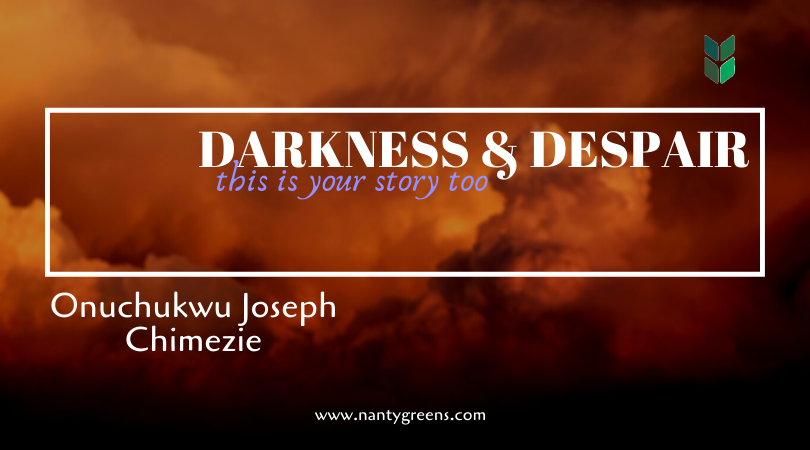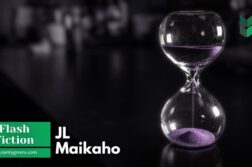
1.
So here you are, seated on the poorly cemented floor with your back against the itchy wall in this small room that shouldn’t even be for the living. Wet in your own sweat and burning with rage and the heat in the crowded room as the sun rays seeped through gaping holes in the corrugated iron roof, you try to suppress tears that would come pouring down like water from a pump. Then you see your mother with a black nylon full of boiled groundnuts walking towards you; sweating profusely in her faded Hollandaise, the tendrils of hair close to the sides of her ear curled from her sweat. Smiling a small, confused smile as she removes her well-tied ichafu, she paused before you.
“Kedu, Nna’m?” she asks. This is when you will start to weep into your palms, as if to gather the shame and throw it away later.
But this story doesn’t start here. Not at all. So how does it – this discomfort in your soul, this wasting away in a close space, this feeling of nakedness, of being displayed – begin?
2.
Let’s say it begins with your father. Your father who was called Odogwu by his gaggle of friends because of his exploits with women and young girls that would have been his daughters had he married when his mates did. Your father, pot bellied with rings of fat for a neck, worshiped anything in a skirt except the ones worn by your mother. Women were your father’s one, true, religion. But we cannot tell the story properly without including your mother, for balance. Your mother, lover of Christ and all things Christian, who constantly prayed for your father to change his promiscuous ways so that God would reign in the house.
Your mother said your father pursued her like a career and on the day she accepted his proposal, it was in front of the church where they had come for a thanksgiving ceremony. She said it was a sign that he proposed around the Church. They had been seeing each other for sometime and had greeted outside the church that day. Your father, petrified in front of his beloved, stuttered on his jokes in the build up to his proposal, and refused to meet your mother’s eyes. Your father tried calling her “Doll” which, in his mind, was a romantic version of her name Dorcas, but couldn’t quite follow through when your mother did not understand, leaving the word hanging in the air only half-formed before he proceeded to ask, in the next breath if your mother would marry him. But several years later, and you in the picture, your father began to wear another skin. Your door always shook with loud warning knocks from angry fathers, mothers, boyfriends and even husbands, warning your father to stay away from their daughters, girlfriends and wives.
But your father, devourer of things in skirts did not take the warnings seriously. Instead, they excited him; this act of playing girls like violins, dribbling them in the manner of an annoyingly talented footballer so that they always missed catching him and making them come back for more. Some of the girls did not know your father had a family. Some did and did not care, thanks to his honey-laced words. You started to wonder how long he had to walk before he realised he was lost for good. But like the ill-fated Titanic, his marriage sunk and remained at the seabed. It was the day you turned sixteen. Your father had impregnated the daughter of your street’s council chairman and ran away so that when the man came with his angry boys, the angry veins on their foreheads popping out menacingly and hands full of weapons, they met just you and your petrified mother. They left, slamming shut the door in your faces, swearing to return to get your father. Your father did not return. End of his chapter. Now, your mother’s.
3.
The day you slid into the world, your mother had cradled you and whispered into your innocent, unresponsive self, ‘You are my hope.’ Her smile was weak but affable. You tiny little thing had come to brighten her world your father had poured darkness into. So she named you Olileanya. Your father wasn’t there.
You were in primary school the first time you saw your mother bruised by your father’s fist. It happened in your presence as you ate in your small apartment. Your father had come home drunk and your mother questioned him. In school, your teachers sent letters to follow you home; the first letter told your parents that you were recalcitrant. The second explained how much evil was in you because you had cut open the palm of a boy who called you a bastard instead of reporting. Others followed until the one that got you expelled. ‘The straw that broke the camel’s back,’ your principal wrote in the letter that said you were improperly dressed. So you stayed at home and hawked boiled groundnuts with your mother.
You returned home one evening from the market to hear shouts and loud thumps as if heavy objects were falling from the skies, for the noise echoed and shook the silent walls of your compound. The shouts persisted so you dashed in to find out what was happening, flinging the tray of groundnuts to the floor. And there, you saw your father treating your mother’s neck to some heavy punches. Frozen, you watched as he kicked her sides till there was blood all over like spilled palm oil and it was after she fell lifeless on the rocky ground, after your father had disappeared into the street, that you rushed to her, shaking her as if she was to respond to insistence. As you sat by her that night at St. Mary’s Hospital, your gaze on the colourless, apparently motionless liquid trickling down the slender tube that was tied to her hand, you would learn your mother had simply asked for a little more money for the soup she was to prepare that evening.
But your mother stayed. Your Christian, good mother who did not agree to anything being bigger than her God, who held vigils in your father’s name and clutched the hope of his repentance like her Bible. Then, your father left and your mother became the receptacle of the shame your father left behind, all of the shame covering her like a shawl; her back bent in a broken way you had never seen before, weeping. The sight paralysed you so you swore to become the hope your mother called you, the beacon at the top of the dangerously eroded hill that was your household; the silver lining in the cloud of darkness your father did not carry with him. So help you God, you muttered under your breath as you dove into the streets of Lagos determined to make ends meet for you and your mother. End of your mother’s chapter. Now, you.
4.
You, the hardworking boy, with the muscular built of a man. You, the opposite of your father as you never chased girls the way your mates did, as if life depended on it. You weren’t exactly like your mother either, as you never went to church. The night you told your mother you would be leaving Onitsha for Lagos to seek greener pastures, she had just recovered from malaria and had sighed painfully. You watched her adjust her weight properly on the faded black chequered cushion as if to allow the news settle well.
‘Why? You can do something for yourself here in Onitsha Nna’m, okwaya?’ she had asked, with a face as gloomy as a faithful in a funeral mass.
‘I know but Lagos is where the life is Mama. I’ll make it quickly and come back to get you, inugo?’ You said flippantly and rustled up a smile as if you were not freaking out inside. The room became as quiet as a crypt; the mosquitoes whine in the darkness, the crickets chirped loudly and you two got in a heated breathing competition before she pulled you close – love in one hand, grief in the other.
5.
When you arrived in Lagos, the only thing you had in mind was to make it big and be your mother’s hope. To make Mama proud. But after just two years in Lagos, without sending anything home to your mum or even getting a place of your own, you had started to give up and that was when you met Kola. He had the dark, bearded good looks of the Yoruba’s, and was heavy with the accents. But he spoke delightful Pidgin English that won your heart. You were clearing the table at the club you worked when his wallet dropped. You ran after him and he couldn’t hide his surprised gratitude when you handed it to him. You turned down the money he fetched out of the multi-layered wallet telling him you wanted to be big like him and his boys and ride same cars with them.
‘I wan dey ball too like una abeg,’ you had said, close to tears.
‘Call me make I throw you small leg,’ he smirked, handing you a card while you watched him drive off.
You stared at the complimentary card all through that night. And the next morning, you were already where you two had agreed to meet.
6.
You were to live with him in a house crammed with five or six other boys; all were handsome young men with dark eyes and full heads of hair and skin that was smooth and unblemished. Their arms were strong. Their posture, good. You saw the good life in them. You told Kola you were ready, using articulate words and short, strong sentences. It did not take you long to blend in, after all is there anything the desperate mind cannot accommodate?
During daytime, you slept, ate, or did anything that required no stress with the boys. At night, you all became heavily active like watchmen on steroids. Your faces brightened by hopefulness and the light emanating from your computer screens, keys clacking under the weights of your fingers on the keyboards, and as if the internet understood the language of your hustle, it did not sleep too. In the beginning, things were slow as the men and women you chatted with did not respond to the pictures you sent them, some complaining the bodies did not glow enough, some did not reply to the business proposals you said you had for them but Kola told you frustration was part of the job and that you would settle in soon. You liked the unthreatening niceness of Kola and even though it confused you a little, you always felt a strange, unfamiliar warmth talking to him.
And true to Kola’s nugget, the money came. The men started to love the glow in the bodies that weren’t yours, the women sent money to invest in your business, chunks of foreign currency that Kola would go bring from the bank and divide between you two with a pat on your back. You feasted to expensive drinks and loud music and celebrated with the most beautiful women. You did not forget to send your mother money, too. You would smile to her eulogies on the phone as she raved about how her new supermarket was one of the biggest in town and how the pastor loved this generator you donated or that bus you gave to the church youths.
‘He blesses you, Nna’m,’ she would say.
7.
Kola had returned shackled in cuffs with some policemen on the day he was supposed to go cash out your biggest hit. The foreigner had loved your new app idea, discussed with his friends and sent some money amounting to over half a billion in Nigerian currency.
‘O boy, you don blow o!’ Kola had screamed, tightening your chest in a hug.
He had nodded to the position where you sat with 7 other guys in your 7 bedroom apartment and the policemen seized all of you, your laptops, and other incriminating gadgets, dragging you and your guys into their van like rams for slaughter and promising you guys cells that smelled of shit with no pores to see daylight. You wept. In the prison, you learned Kola had tried to swindle you by taking some money off the general account into his own private account, had somehow missed a few things and the cashier, smart as she was, had alerted the police while still fawningly smiling at Kola.
‘Guy, why you be like this? I for still give you everything if you want. Wetin I wan tell my Mama now?’ you wept and tore at your dreadlocks. You looked away, angered the more at his facial expression — a dawning whatever that left his jaw dropped.
8.
So as you sit with your mother now, head drooped in shame, you will remember how you promised not to be like your father and a lump will begin to form in your throat. Your mouth is dry now, your chest hurts a little and your neck is stiffening from being cocked at the same angle for too long as your mother slowly raises your head for her eyes to meet yours. And as she wipes your eyes with her ichafu while blinking off the cluster of tears clinging to her lower eyebrow, you will understand. It will be in the unspoken words understood between you two as you break and eat the boiled groundnuts; the dreams of a good life with her, pre-wedding photos with the beautiful Adanna she found for you, the yelps of grandchildren tugging her wrapper, omugo and a happily ever after that has now sojourned with the flood. It will be in the uncertainty and hopelessness creasing her brows as she asks you how long you are to stay here, in the emptiness and void shown in her lens as you nod that you do not know. It will be in the pitiful way in which she will hang her head as she closes her eyes to sigh and spread the heaviness in her eyes to her whole body as if to relieve the pains she feels in her eyes. You will hear it in the rumbling of your guilty heart and the silent movement of the air and even though she will not say it, you will know that you have cemented despair on the foundation of darkness your father had built for you and your mother. You will know that you have surpassed your father in his own game.
*Ichafu – head tie that Nigerian Igbo women wear on their heads with their traditional outfits.
Kedu – how are you?
Nna’m – my son.
Okwaya – isn’t it?
Inugo – do you understand?
Omugo – a visit, usually by mothers, to take care of babies
Onuchukwu Joseph Chimezie is a short story writer. He is currently an engineering student in a Nigerian University. He has been published on Africanwriter, Praxis Magazine and other literary publications. When he isn’t writing, he either argues football with his best friend or chats endlessly with the love of his life. You can follow him on Twitter as @OnuchukwuJosep3 or Facebook as Onuchukwu Joseph Chime


Discussion1 Comment
Bro this is beautiful. And message was well passed across.